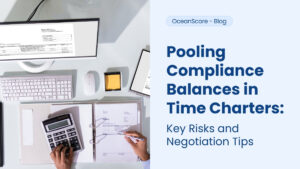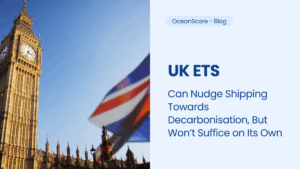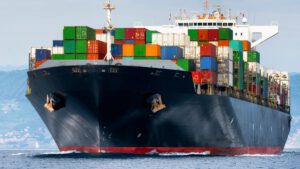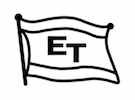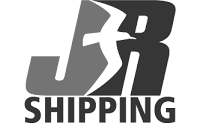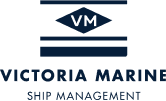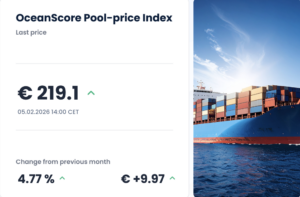Implementation of the FuelEU Maritime regulation from 2025 presents an accountability dilemma for shipping as it is currently the Document of Compliance (DoC) holder that will be held responsible for fuel selection and could therefore face penalties – contrary to the ‘polluter pays’ principle, according to OceanScore.
Shipping companies must start preparing now for the regulation as they face a 31 August deadline to submit a monitoring plan to track the fuel type and consumption for each EU voyage for each vessel as required by FuelEU, says Albrecht Grell, co-Managing Director of the Hamburg-based maritime technology firm.
FuelEU is intended to promote uptake of zero and low-carbon fuels, as well as adoption of sustainable technologies like wind power for fuel efficiency, by mandating progressive reductions in the GHG intensity of energy used by ships over 5000GT compared with a 2020 baseline, rising from 2% next year to 80% by 2050, with penalties for non-compliance.
The default responsible entity for FuelEU compliance remains the DoC holder – typically the technical manager – that has operational responsibility for the ship and handles compliance with a wide range of EU regulations relating to maritime safety under the IMO’s ISM Code.
The DoC holder is also responsible for reporting of emissions and other voyage data under the EU’s MRV regime that will underpin FuelEU, which apparently makes this entity well-placed to manage data collection and reporting processes for the new regulation.
Significant cost exposure
“However, this poses the risk of significant cost exposure for the DoC holder in the event of heavy penalties due to non-compliance with carbon intensity targets, which would far exceed the financial capacity of most ship management companies. They are in no position to carry the related burdens – neither financially nor contractually,” Grell explains.
And he says the clock is ticking as the DoC holder can be slapped with a penalty for each vessel with a compliance deficit as of June 2026, based on the FuelEU report due to be submitted in March that year for the preceding 12-month reporting period.
A similar scenario with the EU ETS resulted in an implementing regulation that designated the shipowner as responsible for compliance, with the option to reassign this responsibility to the DoC holder.
But the EU’s DG MOVE (Directorate-General for Mobility and Transport) has reportedly stated “the responsible entity will not change” as the EU Commission’s powers to make such a change by an implementation regulation are limited under FuelEU.
“The DoC holder does not though have any influence or control over the type of bunkers used on a vessel or investments made and therefore, based on the EU’s overarching ‘polluter pays’ principle, should not be held accountable for the financial impact of those decisions,” Grell says.
“Rather, the consequences in terms of penalties should be allocated to the parties making such decisions, with either the shipowner or charterer responsible for fuel choice depending on the charter party, so this would require a similar mechanism to the EU ETS.”
Ensuring accountability
As things stand though, the most pressing task is to put in place responsible reporting and verification procedures for each ship affected by FuelEU, giving priority to submission of the monitoring plan.
As well as costs incurred due to undercompliance with FuelEU intensity targets, or compliance deficit, there is also surplus from overachieving these targets that can either be banked and carried over for future use or shared with other vessels that have deficits under a pooling arrangement -different from commercial pooling – including non-owned units, to gain compliance for all pooled vessels provided there is a combined surplus.
Consequently, contractual arrangements need to be in place both to ensure costs accountability for the appropriate parties in the case of a deficit and to assign the benefits of surplus to the entities responsible for fuel procurement, whether this is the charterer or registered owner – with data quality a key factor. This will require amendments to the charter party to assign FuelEU costs and benefits, as well as to ship management contracts to align responsibility and costs.
Structural measures can also be implemented by shipowners to mitigate potential penalties and gain competitive advantage, such as wind-assisted propulsion and readiness for onshore power supply.
Respective investment assessments should be prepared, including a technical assessment of the suitability for the specific vessel and trading area as well as the availability of onshore power at likely ports of call. An additional FuelEU requirement for zero-emission at berth will be compulsory from 2030 for container and passenger vessels.
Identifying sources of alternative fuels and running the respective business plans should be part of the same preparations from an operations perspective, according to OceanScore.
Simulation, tracking and transparency
“However, the immediate priorities for shipping companies are to familiarise themselves with the complexities of the new regulation and understand how it might impact their operations and costs. This can be done by simulating decisions in areas such as investments, vessel deployments and alternative fuel usage to decide on the optimal way forward,” Grell says.
He believes it is necessary to set up a management solution to track the compliance balance, emerging penalties and determine accountability, so these costs can be allocated through automated invoicing. Smart simulations can also be conducted to ensure the respective clauses in charter parties are correct, and that there is full transparency around these processes and resulting penalty exposures by the time FuelEU is implemented on 1 January 2025.
While shipping awaits final adjustments to the regulation and BIMCO clauses to clarify the contractual side, OceanScore has developed a new solution to support shipping companies with planning for the impact of FuelEU on a per-vessel and fleet-wide basis, assessing the current exposure, simulating the effect of different fuel and investment strategies, and planning for how to handle remaining compliance balances, including through pooling. This is aligned with OceanScore’s market-leading ETS Manager, including data on vessel, charterer and charter parties as well as bunker consumption.
Once FuelEU enters into force on 1 January 2025, tracking the development of compliance balances and resulting penalties will become of paramount importance, planning future operations and bunker procurements need to be covered, and charterers invoiced based on charter party clauses and incurred compliance deficits.
Leveraging tech and global reach
OceanScore’s upcoming FuelEU Planner will facilitate all these processes, along with engagement between the three main parties in relation to FuelEU transactions – owners, charterers and managers – to secure accountability. As well as assessing the initial FuelEU compliance balance given today’s operational patterns, the new solution will be able to simulate optional scenarios for 2025 to assess their implications for compliance balance and costs.
“FuelEU will also require a new level of collaboration in the industry, given compliance pools can be formed beyond current fleets of owners and managers, while alternative fuels must be matured and onshore power options explored,” Grell says.
“As well as developing smart solutions to navigate regulatory complexity, OceanScore is leveraging its global reach to facilitate new industry partnerships that will be necessary to help shipping companies meet the challenges of the upcoming FuelEU regime.”



